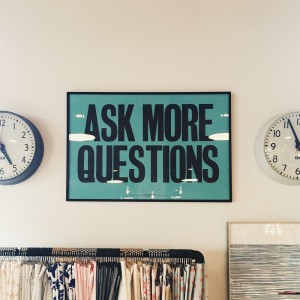What separates a “good” job interview from a “great” one?
There are many factors that will work for or against you when you head in for an interview for a great job. Some factors you don’t have much control over, but most job interview “bombs” are very easy to avoid, if you know what you are looking for.
The Basics

- Show up to the interview on time. If you arrive too early, the interviewer will not be prepared to meet you, and may not have had a chance to fully look over your resume and come up with questions meant to better get to know you. Arrive late and you can mess up the scheduling for the rest of the day.
- Be showered – a strong odor will leave an impression, but not a good one.
- Dress appropriately. This can be harder to judge in advance, so err on the side of formality. Showing up for a job interview at a bar in a full suit can be just as bad as interviewing for a corporate banking position in a t-shirt and flip-flops. Doing some research on the company’s corporate culture can go far for this, since it helps if you already “look” the part of the person they want to hire.
- Have a hair cut/shave. This does not mean no beards or big hair – just that you should rock the best look you have for the interview. Try to look the part they want to hire, not shock your interviewer. They should be impressed by our resume and responses, not at the first impression.
- Know what you are there for. You will probably send out dozens of resumes, but before you get to the interview you should do some intensive research on the company, its background and corporate culture, and anything you can learn about the specific role or team you aim to join. The more at home you seem talking about the role, the better.
- Take Notes. Bring a notepad and pen to the interview, write down key parts of the job position, and write down questions you have to ask. Taking notes makes you look more engaged in the interview, and having your questions handy means you are less likely to forget anything.
No – The Interview Stop Word
You’ve done it – your cover letter rose to the top of the pile, and you were called in for an interview. Everything seemed to be going great – you have all the skills and knowledge they were looking for, and the interviewer laid out all the responsibilities of the position. There are some parts of the role that you have not done before, so you make it clear you wouldn’t be comfortable doing that just yet, or you feel that it is not your strong suit so you would prefer to orient yourself towards other aspects of the role.
Everything else went great, but you were shocked to get an email back the next day that they are going with another candidate.
What Went Wrong?
Always try to think about an interview from the perspective of the manager who wants to fill a position. The manager has specific needs and wants for the candidate, but the most important condition is that whoever they hire needs to be able to fill the gap in the team. If you give the impression that you cannot (or do not want to) do the job they need, they will probably move on. This is even true if you are the most qualified candidate for the position. Most corporations would rather spend extra time training a candidate who is excited for a role than hire someone who does not want to do part of it.
How To Do Better

When given the choice between an under-qualified candidate who is willing to learn and a fully-qualified candidate who does not seem like they want to do the job, managers prefer the first.
If you feel that there are aspects of the job that you truly would prefer not to do, you might not be a great fit for the position.
Ask Questions
Your interview is just wrapping up – the interviewer seems impressed by your resume, the position seems like a great fit for your skills, and everything seems clear for both you and your interviewer. Since you do not have any further questions, you shake hands and head for the door, confident that everything went well.
Unfortunately, they decide to go with another candidate.
What Went Wrong?
Candidates who ask just one, or none at all, can appear disinterested or incurious about the post. With great candidates, between 1/4 and 1/3 of the interview length should be dedicated to questions you ask the interviewer. If you are really “hitting it off”, this number can go up, but if you stop short, it is probably a red flag.
How To Do Better
Asking questions at your interview serves two main purposes:
Sets yourself apart from other candidates

This can also be a two-way street – you should have questions prepared for the interview, but beware of using “best questions to ask at an interview” lists. If the questions you ask seem a little too pre-baked or rehersed, the interviewer can get the impression you’re asking it just to have something to ask. This can suggest a lack of curiosity or disinterest. Using one or two “boilerplate” interviewee questions can work well to cover bases your interviewer has not, but make sure you come up with your own unique to the position.
Show Off
By asking certain questions, you can also highlight your strengths. If you have a set of skills or interests that have not yet been explored in the interview, having some questions prepared can set you up to talk about them. Do you enjoy writing? Ask about how much writing the position requires, and segue into how much you enjoy it. Asking the right questions is a great way to highlight any other skill or competency you think you have relevant to the job, but has not yet come up as part of the interview. Try to have a couple questions reserved just to talk about parts of the job you are most excited about to make a good impression.
Be Prepared For Common Interview Questions
You sat for your interview, but were blindsided by most of the questions the interviewer asked. “Can you tell me about yourself” left you rambling about your latest hobbies (of which he or she takes no interest). When asked “How does this position compare with others you have applied for”, you were left stammering about how you already blew your first two interviews.
You left the interview sure there was no call-back coming, and an email you received the next day confirmed your suspicions.
What Went Wrong?
Your interviewer will probably ask some of the same basic questions asked millions of times before at nearly every job interview. Candidates who have a thoughtful, concise answer will always look more polished than those grasping at straws.
There are two ways these questions can go badly – giving the wrong answer, and giving a rehearsed answer.
A “wrong” answer is one that sets off a red flag for the interviewer. If when describing yourself, you do not list any qualities they are looking for to fill the position, this can be a red flag. A “rehearsed” answer can be just as bad – the interviewer does not want to feel like you are trivializing the question and not putting any serious thought into your response.
How To Do Better
This one is very easy to prepare for, but most candidates overlook it.

For example, one of the most common interview questions is to list your strengths and weaknesses. What interviewers want to hear is that your strengths are something that will specifically help with the role you are interviewing for, and your weaknesses are something you are aware of, are working to improve, and will not impact your performance at this role. This means that for every interview you sit for, the way you answer this question should be a bit different, but keeping with the same theme.
It also helps to practice interview questions with a friend, taking turns as both the interviewer and interviewee.


